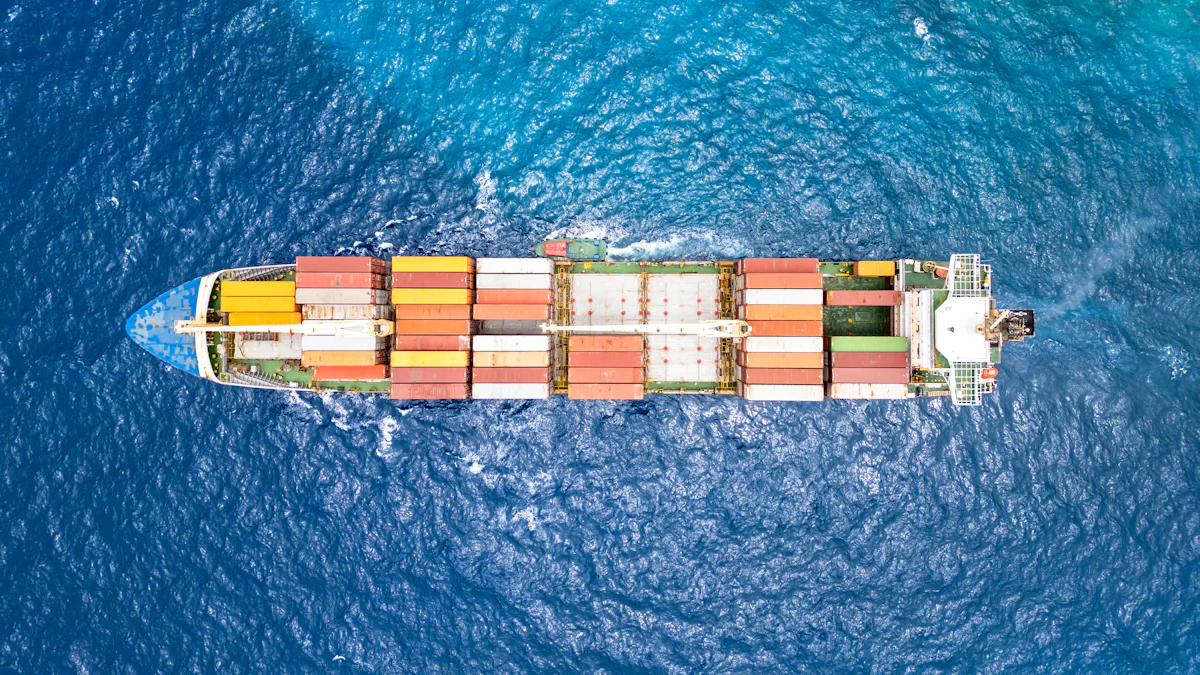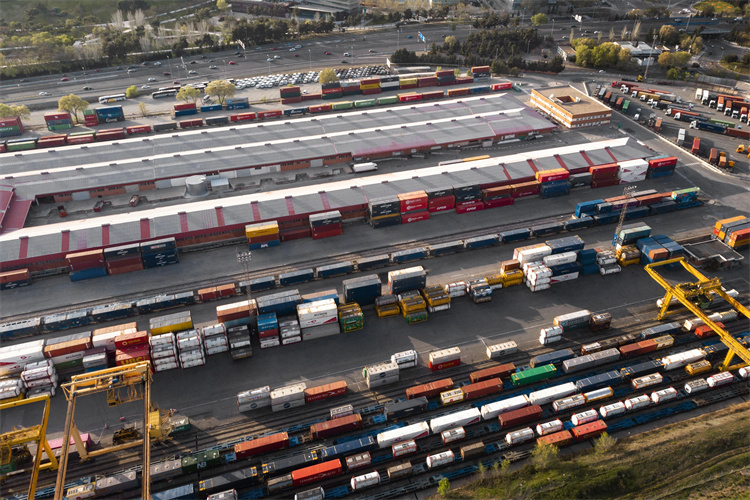Geopolitical Shifts Impacting the Logistics Industry Globally

Geopolitical shifts are reshaping global supply chains, with deglobalization as a geopolitical risk gaining prominence. You see its effects in disrupted trade routes, such as the Suez Canal, and rising costs from tariffs or sanctions. These changes expose pandemic-induced vulnerabilities, challenging the logistics industry. Adapting to these shifts ensures risk mitigation, interdependence, and alignment with esg goals while supporting local economies.
Key Takeaways
Changes in politics, like trade fights and local conflicts, upset global shipping. Businesses need new plans to handle higher costs and challenges.
Using many suppliers and making goods closer to home can make shipping stronger. This lowers risks from political problems and speeds up market responses.
Using smart tools, like AI and blockchain, can improve shipping work. These tools predict problems and make things clearer, keeping shipping steady.
Geopolitics and the Deglobalization of Supply Chains

Trade Wars and Tariff Policies Reshaping Global Supply Chains
Trade wars have become a defining feature of the deglobalization of supply chains. You may notice how tariffs, especially in global value chains, amplify costs. For instance, a product like jeans, assembled across multiple countries, incurs tariffs at every border crossing. This significantly raises expenses compared to a single tariff on domestically produced goods. A U.S. medical device manufacturer experienced this firsthand. Facing 25% tariffs on goods from China, they shifted production to Mexico. However, higher labor costs and reduced productivity offset the anticipated savings, highlighting the complexities of adapting to trade wars.
Tariff policies also reshape logistics strategies. Companies often reconfigure supply chains to manage increased costs, leading to higher demand for warehousing and domestic trucking services. Adjustments in trade flows create opportunities for logistics providers, but they also increase transportation rates and operational complexity. These shifts emphasize the need for innovative solutions to navigate the evolving landscape.
Regional Conflicts and Their Impact on the Logistics Industry
Geopolitical tensions disrupt trade routes and supply chains globally. The Russia-Ukraine conflict, for example, has escalated energy prices and disrupted shipping routes. Similarly, drought conditions in the Panama Canal have forced vessels to reroute, straining international shipping lanes. In the U.S., port strikes have halted containerized imports and exports, further complicating logistics operations.
These disruptions ripple through global markets, increasing costs and causing delays. Businesses face logistical challenges, such as longer transit times and higher shipping expenses. The Federal Reserve Bank of San Francisco has noted that regional conflicts often devastate trade, impacting not just the countries involved but also the broader global economy. You can see how these challenges necessitate robust contingency planning and adaptive logistics strategies.
Shifting Alliances and the Rise of Economic Blocs
Shifting alliances between countries are reshaping global trade patterns. Emerging economic blocs like BRICS+ and RCEP are influencing the deglobalization of supply chains. BRICS+ integrates regional groups such as MERCOSUR and EEU, enhancing trade connectivity among member nations. These alliances shift power balances, creating new opportunities and challenges for logistics providers.
For the logistics industry, shifting alliances bring increased complexity. New trade agreements and regulations alter compliance requirements, while tariffs and sanctions impact transportation costs. For example, Brexit introduced significant changes in customs operations, complicating logistics between the UK and EU. You must adapt to these changes to remain competitive in a rapidly evolving global market.
Deglobalization Trends and Their Influence on Logistics
Nearshoring and Reshoring as Responses to Geopolitical Risks
Nearshoring and reshoring have emerged as key strategies to address geopolitical risks. Companies increasingly move production closer to their target markets to reduce exposure to disruptions. This trend offers several advantages: shorter lead times, lower transportation costs, and improved oversight. Proximity to the marketplace also allows you to replenish inventory faster and respond to market changes more effectively. For example, many businesses now prioritize regions with geopolitical stability to avoid uncertainties caused by trade wars or sanctions.
Recent studies show that 60% of companies are considering reshoring or nearshoring to enhance supply chain resilience. By shortening supply chains, you can reduce risks associated with global events like pandemics or natural disasters. While labor costs may rise in regions like North America, savings from reduced tariffs and transportation often offset these expenses. This approach not only strengthens your supply chain but also improves your ability to meet customer demands.
Supplier Diversification to Mitigate Supply Chain Disruptions
Diversifying your supplier base is another effective way to manage supply chain disruptions. By sourcing from multiple suppliers across different regions, you can minimize risks from geopolitical tensions or natural disasters. This strategy acts like financial portfolio diversification, spreading risk and ensuring operational continuity. A diversified supply chain also enhances efficiency by maintaining a steady flow of goods during disruptions.
Around 76% of companies now focus on diversifying suppliers to reduce reliance on politically unstable regions. This approach ensures you have alternative options if one supplier faces challenges. It also strengthens your supply chain’s resilience, allowing you to adapt quickly to unforeseen events.
Technology-Driven Solutions for Resilient Supply Chains
Advanced technologies play a crucial role in building resilient supply chains. Tools like AI and blockchain enable you to anticipate disruptions and respond proactively. For instance, AI can forecast demand and detect supply disruptions early, while blockchain ensures data security and transparency. These technologies enhance collaboration and provide real-time insights, helping you make informed decisions.
Companies like P&C Global use predictive analytics and real-time monitoring to optimize inventory and maintain production continuity. By adopting such solutions, you can improve flexibility and transparency across your supply chain. Automation and digitalization further streamline operations, reducing costs and enhancing efficiency. These innovations ensure your supply chain remains robust in the face of global challenges.
Implications of Deglobalization for the Logistics Industry
Managing Increased Costs and Complexity in Global Supply Chains
You face growing challenges in managing costs and complexity in global supply chains. Rising material and labor costs force manufacturers to rethink strategies. Material scarcity, driven by trade conflicts and geopolitical tensions, adds to the financial strain. Port congestion and freight delays further complicate logistics operations, increasing shipping expenses. Shifts in consumer behavior during the pandemic make demand forecasting more difficult. These factors highlight the need for strategic adaptations to enhance resilience.
To address these challenges, you must focus on operational efficiency. Freight forwarders are diversifying trade routes and partner networks to mitigate risks. Exploring alternative ports and transportation modes reduces dependency on vulnerable regions. Strengthening supplier relationships ensures early identification of potential issues. By adopting these strategies, you can navigate the complexities of global supply chains effectively.
Opportunities for Innovation in the Logistics Industry
Deglobalization creates opportunities for innovation in the logistics industry. Companies are leveraging advanced technologies like AI and big data to optimize operations. Real-time stock transparency enables faster decision-making, reducing risks in supply chains. Automated stacking systems improve warehouse efficiency by minimizing human error and maximizing space utilization.
Strategic partnerships also drive innovation. Collaborating with suppliers and carriers enhances services like asset labeling and reporting. Digital supply chain platforms enable real-time data sharing, improving responsiveness to market changes. These innovations not only reduce costs but also strengthen your ability to adapt to geopolitical tensions and protectionist policies.
Future Trends in Logistics Amid Geopolitical Shifts
Geopolitical changes will continue to shape the logistics industry. The rise of protectionism and new trade blocs will alter global trade dynamics. Countries are reshoring critical industries to enhance economic resilience, leading to a shift toward local markets. This trend requires you to focus on domestic operations and diversify sourcing strategies.
The regulatory landscape is becoming more complex due to sanctions and protectionist policies. Adapting to these changes will demand agility and robust risk management strategies. Companies that adopt flexible approaches and develop contingency plans will thrive in an unpredictable global market. By staying proactive, you can position yourself for success in the evolving logistics landscape.
JUSDA’s Role in Navigating Geopolitical Risks

Leveraging JusTrade for Seamless Customs Clearance
You face increasing challenges in navigating customs regulations due to shifting geopolitical landscapes. JusTrade simplifies this process by offering intelligent customs clearance solutions. Its advanced SAAS platform integrates AI and big data to streamline operations. You can manage customs procedures efficiently, ensuring compliance with complex regulations. JusTrade’s global network spans 35 locations in China and nearly 20 countries, providing you with reliable support wherever you operate.
The platform enhances security by reducing manual errors and ensuring accurate documentation. Real-time tracking allows you to monitor shipments, minimizing delays and disruptions. JusTrade also supports cross-border logistics, including China-Vietnam and China-Hong Kong routes. These features ensure uninterrupted supply chains, even during geopolitical uncertainties. By leveraging JusTrade, you can maintain operational continuity and strengthen your global trade capabilities.
JUSDA’s Supply Chain Solutions for a Deglobalized World
JUSDA offers tailored supply chain solutions to help you adapt to deglobalization trends. Its Supply Chain Management Collaboration Platform uses AI and blockchain to enhance transparency and efficiency. You can coordinate demand forecasting, shipping, and customs clearance seamlessly. This platform ensures security across all supply chain stages, reducing risks from geopolitical disruptions.
JUSDA’s solutions align with esg goals by promoting sustainable practices. Cloud warehousing and optimized transportation reduce carbon footprints. These innovations not only improve efficiency but also support your commitment to esg principles. By adopting JUSDA’s solutions, you can build a resilient and sustainable supply chain.
Case Studies: How JUSDA Supports Resilient Global Supply Chains
JUSDA has helped many businesses overcome geopolitical challenges. For example, Sharp, a leading electronics manufacturer, faced supply chain complexities due to global market shifts. By implementing JUSDA’s platform, Sharp reduced logistics costs by 20% and improved order processing times. The platform’s real-time tracking and AI-driven insights enhanced security and operational efficiency.
Another success story involves Foxconn, which relies on JusTrade for seamless customs clearance. JUSDA’s expertise ensured compliance with international regulations, enabling Foxconn to maintain uninterrupted production. These case studies highlight how JUSDA empowers you to navigate geopolitical risks effectively while achieving esg objectives.

JUSDA Solutions
To provide you with professional solutions and quotations.
Geopolitical shifts demand your attention as they reshape logistics. Key takeaways include adapting to trade tensions, diversifying supply chains, and leveraging technology for resilience. Proactive strategies like scenario planning and building partnerships ensure readiness. JUSDA’s innovative solutions empower you to navigate these challenges, fostering flexible and efficient supply chains for the future.
See Also
Understanding Current Trends in Logistics Risk Management
Transforming Logistics Through Innovative Supply Chain Solutions
Addressing Global Supply Chain Growth Challenges Effectively
